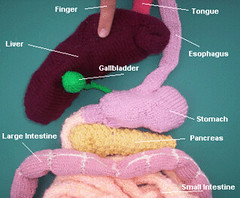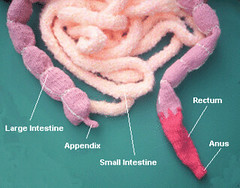Throughout medical history illustrators have used different ways to represent the human anatomy — from early woodcuts to CT-, MR- and PET-scans. The latest addition to this list of ‘technologies of representation’ is knitting:


(by arrmatie, from boingboing)
(it may be inspired by Germaine Koh’s project ‘Knitwork’?).
The idea could perhaps be taken further. I’m thinking of The Museum of Jurassic Technology‘s miniature artworks — in this case, what about cellular microstructures, like mitochondria, knitted out of threads woven from carbon nanotubes and visible only in a microscope? Imagine a Golgi apparatus in multicolor nanotube knitwork!
Whether made out of wool-carbon or nanotube-carbon, the representation of human anatomy in knitting seems to add a whole new (retro-tangible) interpretation to Walter Benjamin’s much-discussed notion of ‘technology of representation’ (see his essay on art in the age of mechanical reproduction, 1936; transl. in H. Arendt, ed., Illuminations, London, 1973; (unauthorized translation here)
Reproducing human anatomy in knitting
Throughout medical history illustrators have used different ways to represent the human anatomy — from early woodcuts to CT-, MR- and PET-scans. The latest addition to this list of ‘technologies of representation’ is knitting: (by arrmatie, from boingboing) (it may be inspired by Germaine Koh’s project ‘Knitwork’?). The idea could perhaps be taken further. I’m […]


